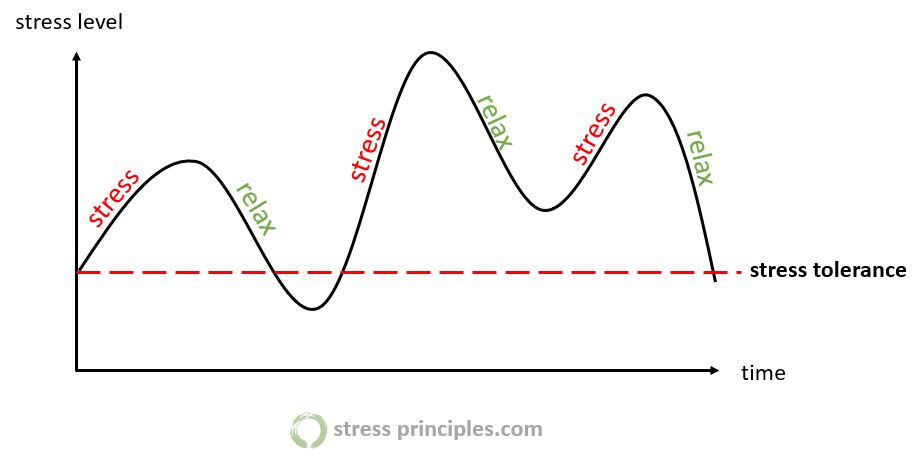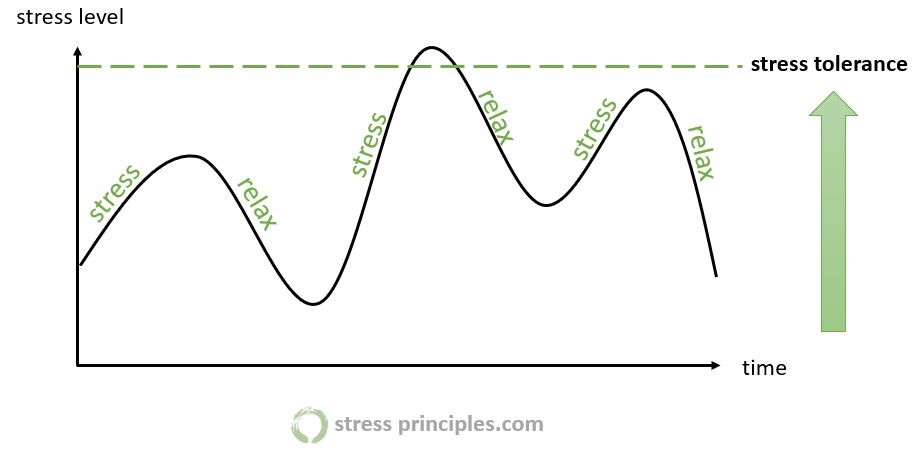Coping with stress is not always easy. In fact, stress is everywhere and almost impossible to avoid. Too much work, increasing costs, too many things to worry about – the world seems to be full of stressors. According to the American Psychological Association, about 77 per cent of people experience stress symptoms on a regular basis. Effective and easy strategies for coping with stress are more important than ever in a world full of constant demands. Fortunately, stress coping is a well-researched field and here you will find the ultimate guide to coping with stress.
Coping with Stress = Relaxation?
Traditionally, the antidote of stress is relaxation. Whenever we feel stressed out, we instinctively look for opportunities to decompress. For example, ways to cope with stress may take the form of spa visits, going out with friends or going on vacations. Similarly, some people end up trying to escape causes of stress by indulging in alcohol or aggression.
Related: Stress Symptoms – The 33 Signs of Stress
Above all the general and simple equation is: the more stressed out you are, the more relaxation you will need.

But is it really that easy? If so, then why are stress-related diseases constantly rising in the western society? In short, sometimes the stress is just too much on us and things like meditation, taking time off, or thinking positively is just not helping enough. Sometimes, coping with stress is too difficult. Some stressors are so intense, that stress remedies somehow will not do the trick. Some stressors are just overwhelming and the stress seems to never end.
We feel stressed out, when our individual stress tolerance level is reached. Meaning, If the stress level is higher than our stress tolerance, then we feel stressed. Likewise, if our stress level decreases, we feel relaxed. Only when our stress tolerance is breached do we feel stressed.

In conclusion, relaxation helps to a certain extent to bring the stress level down. However, it does not come free and we have to make sacrifices, like taking time off. In other words: for every stressor, we need to invest a relaxing activity to reduce our stress level. Even then, it is difficult to reach below our stress tolerance level, especially if the stress compounds. Rather than focusing on reducing stress (over which we have limited control anyway) we should focus on bringing our tolerance level up.

So then coping with stress starts much earlier, even before the stressor occurs. Certainly it is most effective if the stressor cannot even get to us. When there is just no way to stress us out. When we are so stress-resistant, that even the worst stressor will not be able to disturb our peace.
Effective stress coping has not so much to do with the stressor than with ourselves. In other words, our reaction to stress determines the effect stress has on us. Above all, the most effective coping strategies for stress can be found within us.
As a result, we first have to understand the stress process and our part in it to find our inner stress resources . Based on the works of famous psychologist Lazarus (1993), we are going to take a look at each aspect of the stress process and determine the most effective ways of coping with stress.
The process in short looks like this:
- The stressor itself
- Our evaluation of the stressor
- The evaluation of our ability to cope with the stress
- Our reaction, that is the actual coping
While this looks like a sequence, this is not the case. In fact, the various dimensions happen in parallel and we chose the sequential view to slice and dice it. So let’s start with the stressor.
Coping with Stress: the Stressor

Every stress response is triggered by a stressor. For example, a situation that happens to us, mostly something we cannot control. Another person hurting us, our boss and coworkers putting pressure on us, our bills piling up.
While we can to some extent reduce these stressors, say by letting go of relationships, quitting our job or sell everything and move into the woods, in fact these strategies do not really seem sustainable. Yet reducing stress is total en vogue.
We take another, more long-term stance on this: instead of reducing stress, we become better at coping with stress. Instead avoiding potentially stressing situations and thus missing out, we learn how to better deal with stress.
How to cope with stressors
- Be forgiving: not every hurtful event is intended to hurt you. This is to say that not every seemingly violent act is planned that way. We are all human beings and making mistakes is part of the game. Coping with stress is easier when we remember the fact that nobody is perfect.
- Acknowledge your lack of control: again, you cannot influence what happens to you. We are living in a world full of surprises and happenings outside our reach. Accept it and focus on the things you can actually influence. For example, how you want to react.
- Be thankful: instead of looking for ways how everything around us can serve us, we should take a moment and realize everything that we already have. The relationships we have, the things we have accomplished and the opportunities ahead of us. Heck, even having three meals a day is a privilege and the realization makes it easier to cope with stressors.
- Set realistic expectations: do you know the saying about expectations being the first step of disappointment? Well, it is certainly true for stress. Too high expectations are amongst the top stressors and freeing yourself from them will help to cope with stress.
- Engage in deep relationships: our social network is the #1 source for stress relief. Studies have shown time over time how relationships benefit emotional health and wellbeing. The more and the deeper the relationships, the better you can cope with stress.
- Engage in positive routines: regular self-reflection, keeping your home clean, or asking for help can substantially help your stress resistance. Make it a habit to always become better today than you have been tomorrow.
While these ways of coping with stress predominantly help with external events like dangerous situations or an argument with somebody, the most intense stress actually comes from stories we tell ourselves.
We can be in a perfectly safe, relaxing and peaceful situation and still be stressed out due to the worries in our head. Due to the things we hypothesize in the most creative ways. In fact, the stories in our head are where the real coping starts.
Coping with Stress: Our Story About the Stressor

When the stress hits us, our first interpretation deals with what we think about the stressor. In other words, the story is our filter for the things happening around us, like a pair of glasses with colored lenses. Therefore, a neutral event becomes good or bad for us dependent on the story we tell ourselves about it. There is no pain without our imagination. In fact, it is in our hands whether we interpret the stressor as
- Dangerous,
- Challenging, or
- Neutral.
A break-up can be the most stressful event for one person while it is a relief and opportunity for the other. Likewise, losing your job may be a sign of the world conspiring against you or a fresh start to do what you always wanted. In short, coping with stress means knowing the difference and re-framing the stressor.
Above all, it is important to understand how we intuitively explain the world and the things that are happening around us. In other words, are we intuitively afraid of the changes or do we actively look for opportunities to grow?
How to reframe stressors
- Identify the opportunity in stressful situations: sometimes, the situation is not as bad as we initially think and turns out to be the best thing that happened to us. Most inportantly, look for this aspect and you are likely to find it. Even when it seems pathetic, just challenge yourself to find something good in a stressful situation and see where it leads you.
- Rely on facts: We like to manufacture stories around stressful situations and tend to ignore the facts, especially when we are in acute stress. Predicting the future, guessing what others are thinking, or overestimating the effect of a stressor are just three ways these stories can stress you out. Make yourself aware of what actually happened and find the truth about why it happened instead of going wild with theories.
- Don’t assume, instead just ask: again, the hypotheses can make us crazy. Many times, the stress source is just a misunderstanding. Especially when it comes to interpersonal stress, that is stress with other people. Get out of your own way and just ask for clarification. The stress hormone cortisol actually helps you: it makes you want to connect and share with others as a strategy for stress coping.
- Don’t worry about change: everything is constantly evolving, the world is renewing itself every day. Change is inevitable, so why fear it? In fact, avoiding a potentially stressful situation is depriving you of the very resources you need for coping with stress. Instead of wasting your energy on avoiding, try embracing change as an exciting opportunity.
- Learn to let go: Constantly thinking about past mistakes, decisions or relationships is a common source of stress. Stop living in the past and move on. There are so many new and better things ahead of you and you need your energy to for them.
Now that we know how to cope with the stressors in our lives, it is time to deal with the story we tell us about ourselves, our abilities and our resources.
Coping with Stress: Our Abilities and Resources to Manage Stress

We can train ourselves quite well how to reframe stressors in a way that they benefit us. But it is a totally different story when it comes to our self-image. Most of what we think about ourselves is subconsciously controlled and therefore very difficult to tap into, let alone to change.
In fact, to effectively cope with stress coming from our self-imagine, we need to closely look at the sources of stress. Self-doubt, low self-esteem or general beliefs guiding our lives are a good start, but not the end. Here are some ways to begin the journey.
How to cope with your self-image
- Bad thoughts = bad emotions = bad decisions. Understand that your thoughts, feelings, and actions are fully entangled and that you can only cope with stress by changing one or several of these components. Each time you worry and feel stressed, pay close attention if the source is something you have thought, felt, or done. Circle the source and you have a better chance of coping with the stressor.
- Creativity is the #1 source of worry: Again, we tend to create wild stories not only about the stressor but also about its consequences. The more creative you are, the more frightening your story can get. On the contrary, your creativity also defines how inspiring the identified challenge can become. Challenge your hypotheses and you will feel more in control.
- Thoughts are not facts, they are your opinion: Nothing is set in stone and negative thoughts can be turned into positive ones if you challenge them. With every new information we get, our thoughts can change. Actually, also our thoughts about past events. Once you see how a traumatic event has helped you grow into a better person, you will have the power to change your memory about it. The same goes for present demands.
- Know your stress triggers: Identify the places, people, tasks or times of day that clearly stress you. Is it your boss’ office? Is it in the morning or maybe when you are around a particular person? Identify those triggers and coping with them will be much easier.
- Recall your stress coping skills: Remembering how many stressful events you already solved in your life can immensely grow your self-confidence and help you cope with stress.
- Focus on the big picture: Ask yourself, if this stressor will even matter one day, week, or a month from now and you will soon see how insignificant a stressor can become.
- Know what you want and go after it: A clear vision of what you want to reach in life immensely helps your motivation. That is to say, you start to focus on your inner drive and stop to focus on external triggers. In fact, even under extreme pressure, you will always know why it is important to overcome the stress and move forward, no matter what.
- Find your life principles and stick to them: Your principles are the actionable expression of your values. For example: I am not going to lie, I won’t take an unnecessary risk, or I always strive for quality. With this clear playbook, you will be able to steer firmly through a world of constant demands and it will be easy to prioritize your goals over worrying about this and that.
- Acknowledge negative emotions: but don’t let them direct your actions. It is important to embrace our feelings, the full spectrum, as they are part of who we are. However, when you want to effectively cope with stress, you should not allow your emotions to take control. Instead, focus on your goals and principles when making decisions and your emotions will step out of the way.
- Take decisions and accept the consequences: Michael Jordan famously said that the moment he takes a decision, he forgets about it. You should not chew on past mistakes or potentially different outcomes. It will not serve you. Instead, deal with today and use the consequences as opportunities to learn. Remember: there are no failures, only learning.
Conclusion and further thoughts

While our stress response is quite complex and deeply rooted within our identity, it helps to understand the different areas of coping with stress.
The stress process can be regarded in the phases of
- The stressor
- Our story about the stressor
- How we see our ability to manage the stressor
- Our reaction
Naturally, we will find the best way to cope with stress once we are clear about our thought process. Above all, we take the ambiguity out of the situation and establish clarity and understanding, empowering us to take control.
We then have the choice of changing the situation, for example by engaging with the stressor and solving it, or we can simply change our attitude towards it.
Generally, focusing on a healthy lifestyle also increases your stress resistance dramatically. While these things are always beneficial, keep in mind that they will also help you to cope with stress. They include:
- Ensure you have a healthy, balanced diet
- Regular exercise may sound old but is still known as a very effective way to cope with stress. It gives you the opportunity to blow off steam and let negative emotions pass
- Ensure enough rest. This means a healthy work-life balance, regular vacations with plenty of new experiences and most importantly: enough sleep.
Sources and further reading
- Bandura, A. (2010). Self‐efficacy. The Corsini encyclopedia of psychology, 1-3.
- Burgoyne, A. P., Hambrick, D. Z., Moser, J. S., & Burt, S. A. (2018). Analysis of a mindset intervention. Journal of Research in Personality, 77, 21-30.
- Dewe, P. (1991). Primary appraisal, secondary appraisal and coping: Their role in stressful work encounters. Journal of Occupational Psychology, 64(4), 331-351.
- Lazarus, R. S. (1993). Coping theory and research: Past, present, and future. Fifty years of the research and theory of RS Lazarus: An analysis of historical and perennial issues, 366-388.
- Park, D., Yu, A., Metz, S. E., Tsukayama, E., Crum, A. J., & Duckworth, A. L. (2018). Beliefs About Stress Attenuate the Relation Among Adverse Life Events, Perceived Distress, and Self‐Control. Child development, 89(6), 2059-2069.
- Wood, W., Quinn, J. M., & Kashy, D. A. (2002). Habits in everyday life: Thought, emotion, and action. Journal of personality and social psychology, 83(6), 1281.

